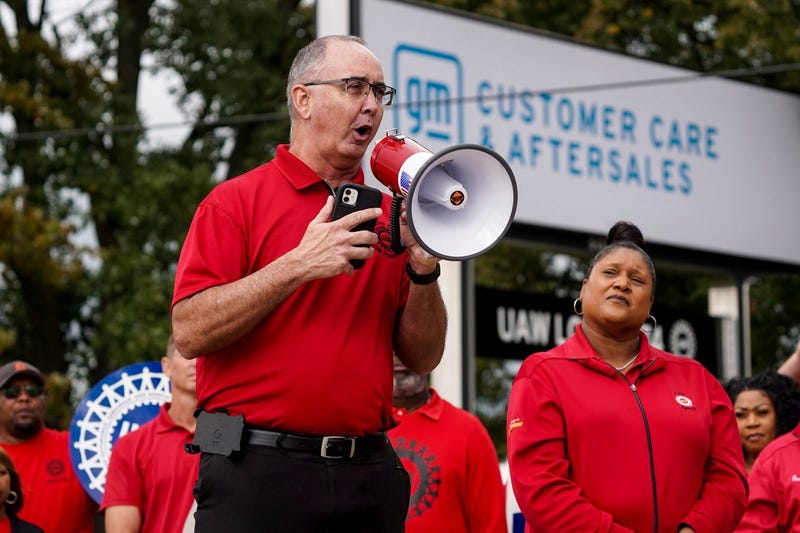
Detroit (WWJ/WBEN) - Despite local layoffs being announced on Friday at the General Motors components plant in Lockport, UAW President Shawn Fain says no new plants will be added to the ongoing strike, and no additional walkouts are planned with the union making meaningful progress in contract talks with Detroit's Big Three auto companies.
"Our strike is working... but we're not there yet," said President Fain on the 22nd day of the strike.
During his update on Friday, Fain talked about progress made with automakers on important points, including cost of living adjustments, meaningful pay raises, retirement security and work-life balance.
The top salary offer on the table, Fain said, is a 23% increase from Ford, while Ford and Stellantis have both agreed to the restoration of the cost of living allowance.
There's also progress, he said, in talks on another major issue: The switch from gas-powered to electric vehicles.
"GM has now agreed, in writing, to place their electric battery manufacturing under our national master agreement," Fain said. "We've been told for months that this is impossible. We've been told that the EV future must be a race to the bottom, and now we've called their bluff."
Fain said Friday the union was prepared to strike at GM's Arlington Assembly Plant in Texas — where SUVs are produced for the Chevy, GMC and Cadillac brands — and that was enough to reach the EV deal.
He said jobs at engine and transmission plants were to be replaced with low-wage battery jobs. However, Fain said they had a different plan.
"Our plan is winning at GM, and we expect it to win at Ford and Stellantis as well," he said.
The strike began on Sept. 15 when the UAW's contracts with the Big Three expired.
Currently, the strike involves about 25,000 workers at five factories and 38 parts distribution centers. 15 of the facilities are in Michigan.
Fain said Friday enough progress is being made that no additional walkouts will be called; at least not today.
"Everything we've done to this point has been with one goal in mind: To win a record contract that reflects the Big Three's record profits," Fain stressed.
Meanwhile, a total of 48 UAW workers in Lockport have temporarily been laid off on Friday. This is as part of more than 2,100 employees that were laid off at plants across the country, according to GM’s Negotiations 2023 website.
“There is no work available for these employees due to labor disputes at other GM facilities,” the webpage states.
According to Ray Jensen, UAW Region 9 Assistant Director, the employees in Lockport laid off on Friday make front and rear HVAC units for the vans that are assembled in Wentzville, which was the first assembly plant to go on strike.
"It's unfortunate when we have layoffs anywhere, but these facilities are so interconnected that there's bound to be layoffs," said Jensen in an interview with WBEN on Friday. "I just want to stress they are temporary layoffs, and those workers will be receiving strike pay. And here in New York, they will be eligible for unemployment when the time comes."
Consulting firm Anderson Economic Group estimated that over $3 billion in economic losses in just the first two weeks of the strike, as manufactures and suppliers lost over $1 billion each, and dealers and customer losing over $1 billion.
Speaking live on WWJ Newsradio 950 earlier Friday, University of Michigan-Flint economics professor Chris Douglas said that if the strike continues, shopping for a car from the Big Three may become difficult.
"I think if it drags on for another month or two that we'll start seeing impacts, because dealership lots with be depleted of new vehicles," Douglas said.
"So another month or so of the strike you could start seeing vehicles wiped out of dealership lots. Maybe consumers who need to buy a new car would need to switch to a foreign automaker, because they would still have inventory," he said. "Well, that would cause General Motors, Ford and Stellantis to lose market share over the long run."
Douglas told WWJ's Jackie Paige that Michigan's economy could take a big hit, and a recession is "definitely possible."
"If you remember back in the 2000s, Michigan had a one-state recession for the better part of that decade that was due to the decline of the auto industry," he said. "Because Michigan is still disproportionately dependent on the auto industry for its economy."
Auto analysts continue to be skeptical of an agreement anytime soon, with WWJ's John McElroy saying he expects the strike to continue into November.
In a statement released following Fain's Friday remarks, Stellantis said the company continues to have "good momentum" at the bargaining table.
"We are making progress, but there are gaps that still need to be closed," the automaker said. "Since the beginning of these negotiations, our focus hasn’t wavered – that is, to reach a balanced agreement as soon as possible that establishes the framework that will allow the Company to be competitive and sustainable in a rapidly changing market and brings our workforce along on the journey."
